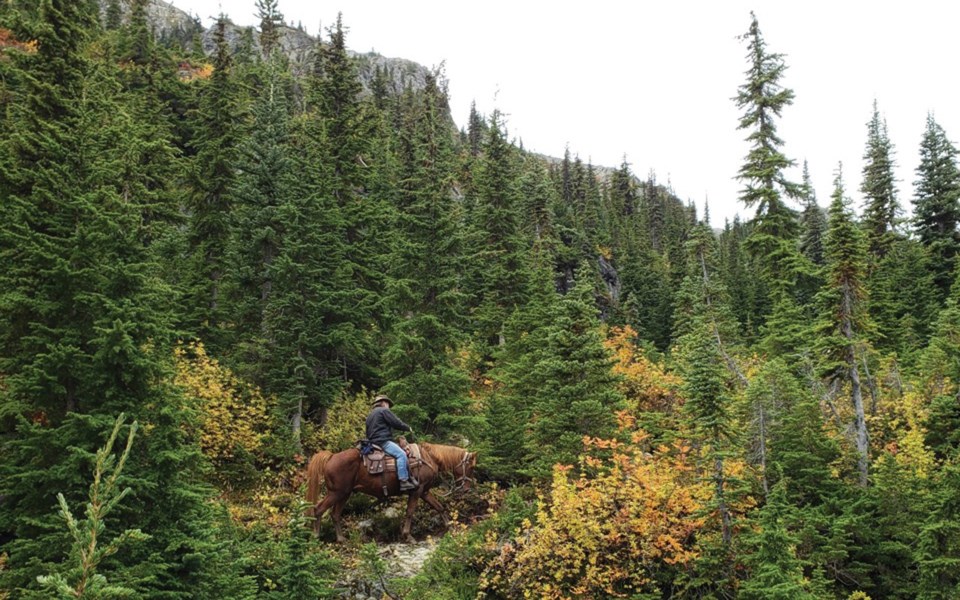As we rode away from the trailhead, the guide turned back to throw a cheerful bit of advice over her shoulder. "You might as well turn your phones to airplane mode now. Save the batteries for the camera." Searching for a signal would drain them dead, since there's none to be found once you ride up the Birkenhead Forest Service Road, north of Pemberton, and into Copper Cayuse Outfitters' 4,000 hectare backcountry tenure.
That comment signalled passage through our first gateway from life as time-bound writers, into a place where the cadence of life is meted out by the crackle of a fire, the steady strike of horse shoes against rock-littered trail, the endless roil of a wild river churning down a mountainside.
The second transition came as I tried to attune myself to the rhythms of the 1,000-pound horse between my thighs. Thirty-six years had lapsed since I'd last been on horseback—trotting around a ring with my hands on my head for some reason I couldn't fathom at eight years old, and still am uncertain about. I hoped some muscle memory gleaned from that peculiar exercise would return. Hoped some cellular memory attributable to the 6,000 year old human-horse relationship might awaken. Hoped I wouldn't die. But more than all that, I was hoping I could convince the horse that I was not afraid at all.
Later, Don Coggins, co-owner of Copper Cayuse Outfitters, with his wife Evelyn Coggins, and partners Dudley and Jan Kennett, said: "It's really simple. Get on, stay on, let them do the work, make sure they know you're the boss." I nodded and smiled, because I did learn over three days riding and camping by the river that things are always simpler than I make them, that the whole adventure could be distilled down to this, but honestly, there was nothing easy about doing any of those things ... simple as they were.
For the first few hours, as we wound our way through the forest to our backcountry camp, I silently beseeched my horse: how can I be helpful? What should I do? What's the best way to approach this attunement thing? Got any tips? Oh, could you please stop eating that nice looking leaf, because the guide said you were really well-fed and we should try and restrain you and I can see it looks quite delicious but I need to be assertive here, is that OK?— trying to establish some kind of telepathic communion with him that was mutually respectful, and didn't indicate my very real feeling of vulnerability. Frantic minutes searching for a horse signal passed, until he finally took pity on me and sent this vibe: just stay on, tell me what you want me to do and I'll do everything else.
Trust. Be still. Settle.
OK then. Be more like cargo, less like someone hyped up on ego and consciousness. More like a mountain, less like a squirrel. Got it.
Simple. Not easy.
It was even more challenging the next day, when the 100-year-old miner's trail we followed took us straight up the mountain, along narrow switchbacks I would have avoided on foot, and would not been able to ski-tour up. This is terrain these horses were born for—the "cayuse" breed, with deep local roots, is powerful and surefooted and utterly at ease in this mountainous territory.
I poured my trust into my horse, felt the deep steadiness of him, and over the course of the day, my slightly forced smile became a bit more natural.
Copper Cayuse Outfitters began in 2009 with half day and day tours at their ranch and in their tenure in the Birkenhead-Tenquille area. After clearing the brush back to reactivate the old miner's trail to three gold mines, they began to offer the Li-Lik-Hel expedition in 2015. In an era, and place, where mountain adventure is increasingly dominated by gondolas, mountain bikes and motorized vehicles, they're preserving horseback culture and through three-day experiences offering a chance to really step out of time.
Deep Time isn't something you can think about when tethered to a phone, a clock, an agenda, but a horse, strangely, can step you into the timeless. At first, the lack of urgency is disorienting, even a little boring. What am I meant to be doing, thinking, feeling? Just sitting here? All grasping and squirrel-chatter, my decompression took at least a day without phones, a campfire, a rum, the sound of rain against my tent, beside the river singing as it did a thousand years ago.
The forest was full of lodgepole pines, draped in long strands of old man's beard. Lichens and mosses are some of Earth's oldest living organisms. The gold that was extracted from the mines a hundred years earlier, was horse-packed out along the same trails we had picked our way down, had been created when neutron stars collided, existed as dust out of which the Solar System was formed, and sank into the Earth's molten core long before these mountains grew and hardened into granite and quartz that could be chiseled away by gold-fevered men.
Trust. Be still. Settle.
Coggins was told that Lil'wat women would come up into these mountains in the final stages of their pregnancies to give birth in this place, and would remain for a time afterwards, so the fourth trimester could unfold somewhere peaceful.
Our final ride before we drove back into civilization took us through mist-and-lichen-draped pines. We moved through stillness, not even disturbing two white-tailed deer who turned and watched us walk by, their ears flicking just like the horses' did, all of us acknowledging, witnessing, tethered to some greater connectedness, something that moves in millennia not minutes, something that might be felt but only when we move beyond the reach of words.
The Velocity Project: how to slow the f*&k down and still achieve optimum productivity and life happiness.




